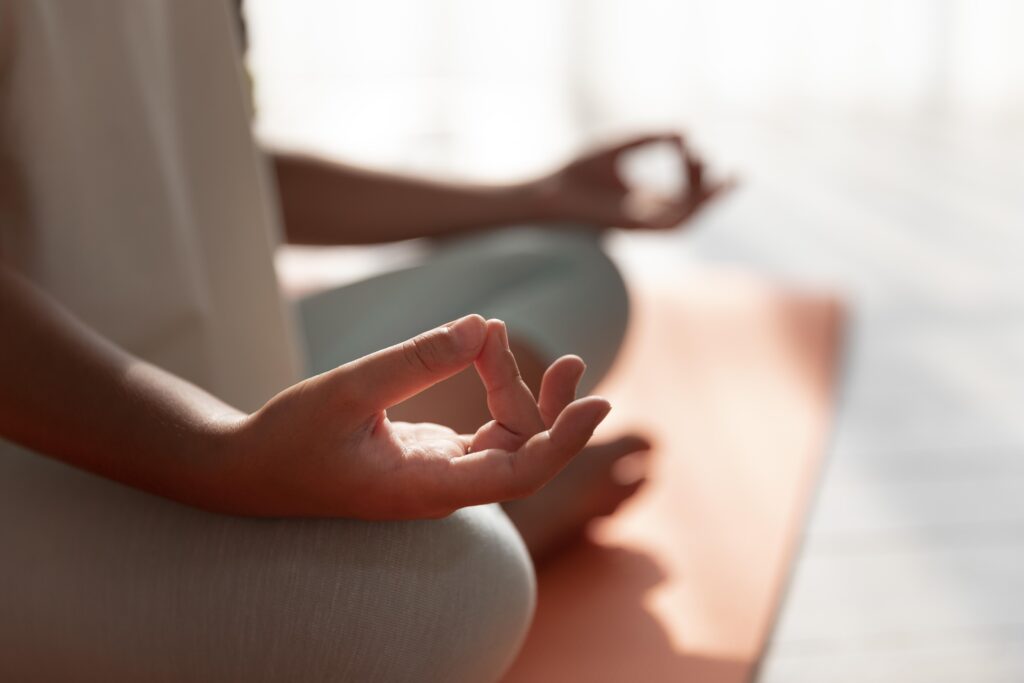Introduction
Ever catch yourself stuck in a workout rut, wondering why your results seem to stall—no matter how much you sweat? Here’s a wild thought: what if the secret to faster gains, better recovery, and real consistency isn’t just in your muscles, but in your mind? Meditation isn’t just for the super-zen or yoga crowd. It’s a potent tool that can actually transform the way you train, recover, and perform.
The Surprising Link Between Mind and Muscle
Why Mental State Matters in Physical Performance
Think of your body as a high-performance car. Sure, the engine matters, but if the driver’s distracted, anxious, or zoning out, that car isn’t reaching its full potential. Your mind is the driver of your workouts. Stress, nerves, or a lack of focus can tank your performance—even if you’re physically in great shape.
Scientific Studies Connecting Meditation and Fitness
Research keeps showing that meditation isn’t just about “feeling good.” Studies link mindfulness and meditation practices to improved athletic performance, faster recovery, and even better body composition. Athletes who meditate report less anxiety before competitions, lower levels of stress hormones, and more motivation to stick with their training.
What Is Meditation, Really?
Types of Meditation You Can Try
Let’s clear up a myth: meditation isn’t just sitting in silence trying to think about nothing. There are tons of ways to meditate, and you don’t have to chant or sit in lotus position (unless you want to).
Mindfulness Meditation
This is about noticing what’s happening in the moment. You focus on your breath, your body, or even the sounds around you. No judgment, no pressure.
Guided Visualization
Imagine yourself acing a lift or running your fastest mile. Guided meditation helps you mentally rehearse success, which actually primes your body to perform better.
Body Scan and Progressive Relaxation
This style helps you tune into different parts of your body, release tension, and notice aches or soreness before they become injuries.

How Meditation Differs from Just “Zoning Out”
Zoning out is passive—you’re not really aware of anything. Meditation, on the other hand, is about being present. It’s a skill, like any other, and it takes practice. But the payoff? Huge.
The Science-Backed Fitness Benefits of Meditation
Reducing Stress Hormones for Better Recovery
When you push hard, your body floods with cortisol. Too much, and your muscles can’t repair as quickly. Meditation helps dial down those stress hormones, so you recover faster and bounce back stronger.
Boosting Focus and Motivation
Ever flaked on a workout because you just “weren’t feeling it”? Meditation trains your mind to focus, so you can power through the mental blocks that hold you back.
Enhancing Sleep Quality
Good sleep is like the cheat code for fitness. Meditation helps you wind down, fall asleep faster, and get that deep, restorative rest your muscles crave.
Lowering Perceived Exertion
Here’s a neat trick: meditation can make hard workouts feel easier. By learning to tune into your breath and body, you can actually lower your perception of effort—meaning you’ll push harder, for longer.

Meditation as Your Pre-Workout Secret Weapon
Setting Intentions for Your Workout
Instead of jumping right in, take a minute to set a goal. Maybe it’s hitting a new PR, or just making it through a tough set. Visualizing this goal can boost your performance and keep you on track.
Warming Up the Mind, Not Just the Body
A quick meditation before you start helps you leave the day’s stress at the door. When your mind’s clear, your body follows.
Visualization for Performance Gains
Elite athletes have used visualization for decades. Picture yourself nailing that squat or sprint. The more vivid, the better—your brain starts to believe it’s possible, and your body follows suit.
Meditation for Faster Recovery and Less Injury
Calming the Body’s Stress Response
After a tough session, your body’s in overdrive. Meditation helps shift you into “rest and repair” mode, so your muscles can rebuild.
Mindful Breathing to Soothe Soreness
Slow, deep breaths signal to your nervous system that it’s safe to relax. This can actually ease muscle soreness and speed up recovery.
Getting in Tune with Your Body’s Signals
Meditation makes you more aware of little aches and pains—so you catch injuries before they become a big deal.
How Meditation Improves Consistency and Discipline
Building a Habitual Mindset
Sticking to a fitness routine is tough. Meditation builds discipline by teaching you to show up, even when you don’t feel like it.
Breaking Through Plateaus with Mindfulness
We all hit walls. Mindfulness helps you notice what’s holding you back—boredom, frustration, fear of failure—and work through it, instead of giving up.
Staying Motivated When the Going Gets Tough
Fitness is a marathon, not a sprint. Meditation helps you stay connected to your “why,” so you keep showing up, even when progress feels slow.
Meditation Techniques for Fitness Lovers
Quick Mindfulness Practice Before the Gym
Close your eyes, take five deep breaths, and focus on how you want to feel during your workout. Just 60 seconds can make a big difference.
Guided Meditation Apps for Athletes
There are tons of apps designed for active people—think Headspace, Calm, or Insight Timer. Try a few to see which vibe fits you best.
Breathing Exercises to Use During Workouts
When things get tough, focus on your breath. Inhale for four counts, exhale for six. This keeps your heart rate steady and your mind clear.

Real-Life Stories: Athletes Who Swear By Meditation
Elite Performers and Their Meditation Routines
LeBron James, Novak Djokovic, and many Olympians use meditation as part of their training. They credit it with helping them stay cool under pressure and bounce back from setbacks.
Everyday Athletes and Success Stories
You don’t have to be a pro to see results. Tons of regular folks find that a few minutes of meditation each day helps them stick to their routine, recover faster, and actually enjoy working out.
How to Start a Meditation Practice That Sticks
Setting Up a Simple Routine
Start small—just five minutes a day. Pick a time (before or after your workout works great) and stick with it. Consistency is more important than duration.
Common Mistakes Beginners Make
Don’t beat yourself up if your mind wanders—that’s normal. The goal isn’t to “empty your mind,” but to notice when you get distracted and gently bring your focus back.
Tips for Staying Consistent
Anchor your meditation to something you already do, like lacing up your shoes or stretching. The easier it is to remember, the more likely you’ll actually do it.
Combining Meditation with Other Wellness Habits
Nutrition, Sleep, and Mindfulness: The Trifecta
Great fitness results don’t come from workouts alone. Pair meditation with solid nutrition and good sleep, and you’ll feel like you’ve unlocked a cheat code.
Stretching and Yoga with Meditation
Yoga is basically moving meditation. Try finishing your workout with a few stretches and a minute of deep breathing—it’s the ultimate cool-down.
Conclusion
Meditation isn’t just a “nice to have” for fitness junkies—it’s a game-changer. Whether you’re chasing a new PR, trying to recover faster, or just looking to enjoy your workouts more, a simple meditation practice can help you get there. Your mind and body are more connected than you think, and training both will take your fitness to the next level. So next time you hit the gym, don’t just warm up your muscles—warm up your mind, too.
FAQs
Can meditation replace my warm-up?
Nope. Meditation preps your mind, but your muscles still need a physical warm-up to avoid injury. Do both for best results.
How long should I meditate for fitness benefits?
Even five minutes a day can help. If you can go longer, great—but short sessions are better than nothing.
Is meditation helpful for weight loss?
Indirectly, yes. Meditation helps reduce stress (which can lead to emotional eating) and keeps you focused on your goals.
Can meditation help with sports injuries?
It won’t heal injuries by itself, but it can speed up recovery by lowering stress and helping you listen to your body’s needs.
What’s the best time to meditate for fitness?
Whenever you’ll actually do it! Before a workout can boost focus; after can speed recovery. Try both and see what works for you.

